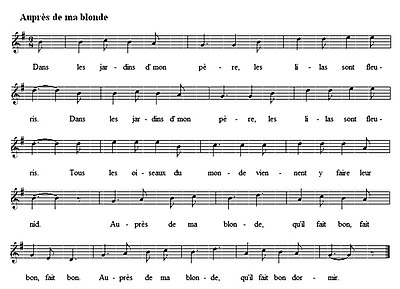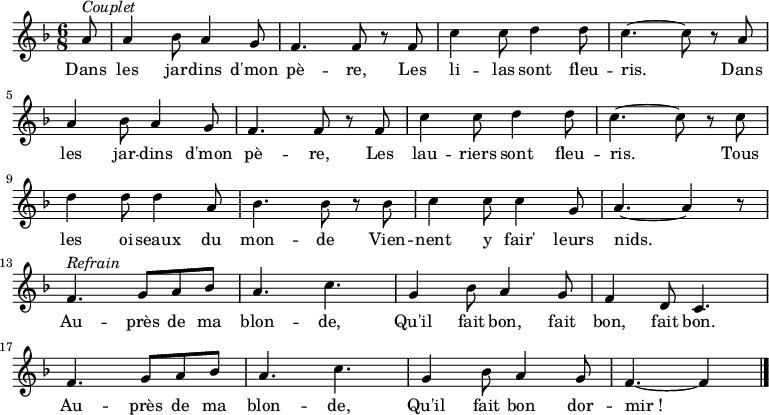Auprès de ma blonde: Difference between revisions
mNo edit summary |
SimLibrarian (talk | contribs) mNo edit summary Tags: Mobile edit Mobile app edit iOS app edit |
||
| (16 intermediate revisions by 11 users not shown) | |||
| Line 1: | Line 1: | ||
{{Short description|17th century chanson}} |
|||
{{Unreferenced|date=December 2009}} |
|||
{{More citations needed|date=October 2020}} |
|||
| ⚫ | "'''Auprès de ma blonde'''" (French for "Next to My |
||
{{Expand French|Auprès de ma blonde|date=June 2020}} |
|||
[[File:Auprès de ma blonde. |
[[File:Auprès de ma blonde.jpg|thumb|upright=1.8|''Auprès de ma blonde''<br>[[File:Auprès de ma blonde (4 part).mid|frameless]]]] |
||
| ⚫ | "'''Auprès de ma blonde'''" (French for "Next to My Girl") or "'''Le Prisonnier de Hollande'''" ("The Prisoner of [[Holland]]") is a popular [[chanson]] dating to the 17th century. The song tells the story of a woman who laments to the birds in her father's garden that her husband is a prisoner in Holland. It appeared during or soon after the [[Franco-Dutch War]] (1672–78), during the reign of [[Louis XIV of France|Louis XIV]], when French sailors and soldiers were commonly imprisoned in the Netherlands. |
||
The song's quick pace and lively melody made it well-suited to military marches, and it is still commonly played at parades. For the same reasons, it gained widespread popularity as a [[drinking song]] and [[nursery rhyme]]. |
The song's quick pace and lively melody made it well-suited to military marches, and it is still commonly played at parades. For the same reasons, it gained widespread popularity as a [[drinking song]] and [[nursery rhyme]]. |
||
== |
==History== |
||
The song was composed in 1704 during the reign of [[Louis XIV]]. A local tradition attributes the composition to André Joubert du Collet.<ref>{{cite book |first=Marc |last=Robine |title=Anthologie de la chanson française |language=fr |publisher=[[Éditions Albin Michel]] |year=2000 |isbn=2226074791 |page=291}}</ref> |
|||
*Film: The song is heard during the parade scenes at the end of ''[[The Day of the Jackal (film)|The Day of the Jackal]]''. An English version of the song, titled "I love only one girl" (''"the one I've got my arms around"''), was sung by [[Elvis Presley]] in the 1967 film ''[[Double Trouble (1967 film)|Double Trouble]]''. (Lyrics for the Elvis version were by American songwriters Sid Tepper and Roy C. Bennett.) In the 1952 musical comedy film ''[[April in Paris (film)|April in Paris]]'', Doris Day and Claude Dauphin sing (and dance to) this song in the kitchen of a French ocean liner. The melody is hummed by actors [[Ian Holm]] and [[Christopher Lambert]] in [[Greystoke: The Legend of Tarzan, Lord of the Apes]]. It is heard in the exit music of the 1938 film, "Marie Antoinette," starring Norma Shearer. The song is also sung by Christine Daaé in the 1990 miniseries [[The Phantom of the Opera (miniseries)|The Phantom of the Opera]]''. Sung by an unseen group in the opening scenes of THAT HAMILTON WOMAN (1941), starring Vivien Leigh and Laurence Olivier. |
|||
*Television: The song appeared in two episodes of ''[[Star Trek: The Next Generation]]'', "[[Family (Star Trek: The Next Generation)|Family]]" and '"[[Final Mission]]". It also appeared in the British TV movie ''[[Sharpe (TV series)|Sharpe's Revenge]]'' being sung by General Calvet's men to [[Richard Sharpe (fictional character)|Richard Sharpe]] and Lucille. The song appears as background music in a Marseille cafe in ''Alfred Hitchcock Presents'', episode No. 3.22 of 2 March 1958 "The Return of the Hero". It's also sung by Sarah Moffatt in two episodes of ''[[Upstairs, Downstairs (1971 TV series)|Upstairs, Downstairs]]''. Its refrain also serves as a central theme in one episode of "Have Gun Will Travel" Season 6, Episode 27 (title: The Savages). It is also found in [[Starsky & Hutch]] season 4 episode 8, "Dandruff". |
|||
*Books: ''Auprès de ma blonde'' is the title of a 1972 detective novel by Nicolas Freeling featuring Commissaris Van der Valk, and his wife Arlette of Amsterdam. |
|||
* In [[Dorothy L. Sayers]]' novel ''[[Busman's Honeymoon]]'', the newly married [[Lord Peter Wimsey]] sings the song to express his happiness. |
|||
*In [[Roger Zelazny]]'s book ''[[Nine Princes in Amber]]'', [[Corwin of Amber|Corwin]] claims to have been the one who composed the tune to "Auprès de ma blonde". |
|||
{{wikisourcelang|fr}} |
|||
*In ''[[The Secret Life of Walter Mitty]]'', Mitty hums the tune in a war-time scenario. |
|||
*In the 1958 film [[Lafayette Escadrille (film)|Lafayette Escadrille]], the concierge of a small hotel sings the song to express his joy at the reunion of the film‘s young lovers. |
|||
* A French singer sings this song in the court of Prinny, in the movie "[[The Return of the Scarlet Pimpernel]]." during a ball scene. The time is supposed to be that of The Terror, and the enthusiasm with which this song is greeted shows that the British aristocracy never heard it before. That is a time anachronism because this chanson existed in the 17th century. |
|||
*In ''[[Missing Person (novel)|Missing Person]]'' by Patrick Modiano, the tune is mentioned briefly, towards the end of the novel, in Chapter 43. |
|||
*In the architectural manifesto ''[[Nine Points on Monumentality]]'' (1943) by [[Sigfried Giedion]], [[Fernand Léger]] and [[Josep Lluís Sert]], selected verses are quoted as indicative of popular perceptions on monumentality. |
|||
*[[Pepé Le Pew]] is singing a refrain in the 1962 [[Chuck Jones]] short '[[Louvre Come Back to Me!]]'. |
|||
*In [[Frederic Manning]]'s book ''[[Her Privates We]]'', when asked by a French lady if he sang, Bourne replied with a rendition. |
|||
*The song is the first track of "Songs of the World" by the [[Norman_Luboff#Norman_Luboff_Choir|Norman Luboff Choir]]. It was meant to represent France, on a two album set that included songs from all around the world. |
|||
== Music == |
== Music == |
||
<score |
<score> |
||
\new Staff { |
\new Staff { |
||
\relative c'' { |
\relative c'' { |
||
| Line 75: | Line 63: | ||
} |
} |
||
} |
} |
||
</score> |
</score> |
||
==See also== |
|||
*[[Compagnies Franches de la Marine]] |
|||
*[[Corps of Royal Canadian Electrical and Mechanical Engineers]] |
|||
==References== |
|||
{{Reflist}} |
|||
{{Authority control}} |
|||
{{DEFAULTSORT:Aupres De Ma Blonde}} |
{{DEFAULTSORT:Aupres De Ma Blonde}} |
||
[[Category:French songs]] |
[[Category:French songs]] |
||
[[Category:French folk songs]] |
[[Category:French folk songs]] |
||
[[Category: |
[[Category:18th-century songs]] |
||
[[Category:Songs about the Netherlands]] |
|||
Latest revision as of 06:57, 6 June 2023
This article needs additional citations for verification. (October 2020) |
You can help expand this article with text translated from the corresponding article in French. (June 2020) Click [show] for important translation instructions.
|

"Auprès de ma blonde" (French for "Next to My Girl") or "Le Prisonnier de Hollande" ("The Prisoner of Holland") is a popular chanson dating to the 17th century. The song tells the story of a woman who laments to the birds in her father's garden that her husband is a prisoner in Holland. It appeared during or soon after the Franco-Dutch War (1672–78), during the reign of Louis XIV, when French sailors and soldiers were commonly imprisoned in the Netherlands.
The song's quick pace and lively melody made it well-suited to military marches, and it is still commonly played at parades. For the same reasons, it gained widespread popularity as a drinking song and nursery rhyme.
History
[edit]The song was composed in 1704 during the reign of Louis XIV. A local tradition attributes the composition to André Joubert du Collet.[1]
Music
[edit]
See also
[edit]References
[edit]- ^ Robine, Marc (2000). Anthologie de la chanson française (in French). Éditions Albin Michel. p. 291. ISBN 2226074791.
